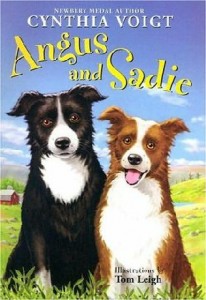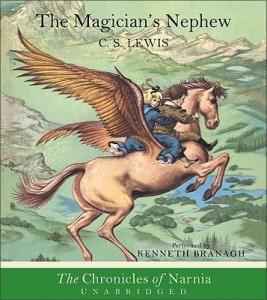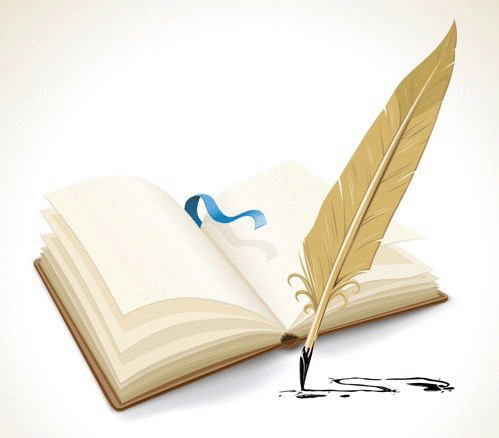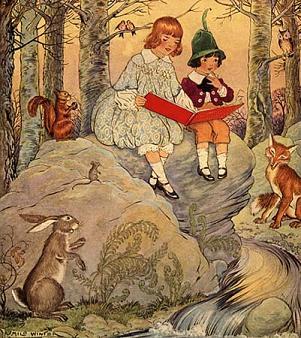Books in the atmosphere
I’ve been reading in undisciplined fashion this summer — which means that instead of being in my usual one-book-at-a-time mode, I’m in multi-read mode. Currently I’m alternating between Anne Lamott’s Bird by Bird, Edith Nesbit’s Treasure Seekers, and, in preparation for my soon-to-be sixth grader’s reading list for next year, Don Quixote. (Hers will be an abridgement!) The multi-read mode is risky for me; I always wait with bated breath to see if I’ll finish any of the books on my nightstand. But it’s part of my summer state of mind to take an airier approach.
 Meantime, the girls and I have thoroughly enjoyed Cynthia Voight’s Angus and Sadie as a read-aloud. For a family of border collie owners, this lighthearted story about two border collies adopted by a young couple on a farm hit the spot. Angus and Sadie have distinctive personalities and strengths, and as they undergo training and make the adjustment to their new home, we learn about their experiences from their point of view. Both active, bold Angus and biddable, timid Sadie eventually find their niche on the farm and illustrate the different ways the herding instinct can manifest itself.
Meantime, the girls and I have thoroughly enjoyed Cynthia Voight’s Angus and Sadie as a read-aloud. For a family of border collie owners, this lighthearted story about two border collies adopted by a young couple on a farm hit the spot. Angus and Sadie have distinctive personalities and strengths, and as they undergo training and make the adjustment to their new home, we learn about their experiences from their point of view. Both active, bold Angus and biddable, timid Sadie eventually find their niche on the farm and illustrate the different ways the herding instinct can manifest itself.
This week we started Charles Lamb’s Tales from Shakespeare in a belated effort to enrich our history study. I showed the girls the typical play format in my imposing Pelican Shakespeare, then made the transition to the paperback edition of Lamb’s book of summaries for children. So far it’s going well and seems like an effective and pleasurable way to introduce an overview of England’s most famous playwright.
In the airwaves, the girls have had various audiobooks playing. Little Town on the Prairie was timely to hear just before the fourth of July, since it devotes a chapter to the embryonic town of De Smet’s Independence Day celebration — complete with a reading from the Declaration of Independence. I was struck by the keenness of these pioneers’ gratitude for their freedom. They had their share of hard times and were far from wealthy, but they had a work ethic, an impressive range of practical skills and useful knowledge, and a fierce desire to make their own way in the world that made their freedom deeply meaningful. I feel my lack of such a knowledge inheritance, and I wonder what its loss will ultimately cost. I can’t help but wonder if freedom is frightening to a people who have lost the basic ability to survive without dependence on machines, systems, and consumable products.
 The other story in the air around here has been The Magician’s Nephew. I’m always struck by the rollicking humor in the story, which I never really picked up on till I heard Kenneth Branagh’s reading. The scenes involving the White Witch’s adventures in London are pure comedy, and there is something magical, always, about hearing the stories read with a British accent. The other theme I was interested in this time was the “olden times” theme. It’s establishing a history of Narnia, so it’s a narrative necessity for it to take place in the past for Lewis’s audience. But there is a touch of satire, too. Lewis’s narrator doesn’t really glorify the past, but in some places he does seem to acknowledge that he is free to take artistic license with it — to exaggerate a bit here and there, or to generalize. When Aunt Letty is hurled across the room by Queen Jadis and recovers, we’re told that aunts were often tough old ladies “in those days.” And when Polly is sent to her room after a supper with all the “nice parts taken out,” we’re told, “It was a thing that happened to one quite often in those days.” It sounds to me like he’s gently poking fun at the tendency we have to recast history and make a better story out of it — kind of like Frost’s speaker in “The Road Not Taken,” who sees no essential difference between the two roads before him at the moment of choice, but who knows that later he’ll make a good story out of it.
The other story in the air around here has been The Magician’s Nephew. I’m always struck by the rollicking humor in the story, which I never really picked up on till I heard Kenneth Branagh’s reading. The scenes involving the White Witch’s adventures in London are pure comedy, and there is something magical, always, about hearing the stories read with a British accent. The other theme I was interested in this time was the “olden times” theme. It’s establishing a history of Narnia, so it’s a narrative necessity for it to take place in the past for Lewis’s audience. But there is a touch of satire, too. Lewis’s narrator doesn’t really glorify the past, but in some places he does seem to acknowledge that he is free to take artistic license with it — to exaggerate a bit here and there, or to generalize. When Aunt Letty is hurled across the room by Queen Jadis and recovers, we’re told that aunts were often tough old ladies “in those days.” And when Polly is sent to her room after a supper with all the “nice parts taken out,” we’re told, “It was a thing that happened to one quite often in those days.” It sounds to me like he’s gently poking fun at the tendency we have to recast history and make a better story out of it — kind of like Frost’s speaker in “The Road Not Taken,” who sees no essential difference between the two roads before him at the moment of choice, but who knows that later he’ll make a good story out of it.
Last but not last — and not entirely literary, either — is Pride and Prejudice, courtesy of Netflix. This television mini-series from 1995 with Jennifer Ehle and Colin Firth is my favorite movie version of the story, and I re-watch it periodically to regale my ears with elegant language and my eyes with elegant manners and clothing. The girls have tuned in this time with great enthusiasm. We don’t watch much T.V. around here, but it’s been a lot of fun celebrating what appears to be our first chick flick fest together. I hope that when they get around to reading the real thing the good memories will serve as motivation.




6 Comments
Ruth
:-) I love watching that kind of period piece with my daughter. SO fun.
Barbara H.
I like that version of P&P, too. How fun to have daughters to watch it with.
I have the Focus on the Family version on Narnia but I can’t remember if it is a dramatization or a reading. It’s been a while since we listened to them but I might pull them out after reading a couple in the series for Carrie’s Narnia challenge this month.
Polly
We are reading The Magician’s nephew here this summer too! I’m reading it to Madison and she is reading me “Arthur’ (the monkey) books. For myself I just finished “Half the Church” and am re-reading The Summer of the Great-Grandmother, and next up is Jayber Crow! All of those are possible titles for school next year. My reading is always undisciplined, but I am trying to reign myself in a bit.
Amy @ Hope Is the Word
I’m on a contemporary novels kick right now (with the notable exception of a Lord Peter Wimsey in audio), which usually exhausts me emotionally, so I’m sure I’ll dive into something old and familiar once I’m through this stack.
Thank you for clearing up the mystery of how on earth our eldest was able to quote the beginning of the Declaration of Independence by heart–of course! The LIW audiobook marathon that happens around here at least every two weeks! :-)
I need to go back and watch that P & P again. It has been years since I’ve seen it.
JW
Back to the Trollope… It was tedious? You talk about tedious. I have been trying to read Rob Roy for MONTHS now. Ugh. Someone please tell me what is so great about that book. And it is supposed to be his BEST novel. Really? I’d like to know why.
And there was a Trollope book that I was thinking of reading. But now I can’t remember what it was. Is he famous for one in particular? OR did he just write a lot? But you say he is tedious? Now I am not sure that I want to read whatever it was… The Warden maybe? Is that one any good? Just wondering..
Thanks for the reviews! :-) Did you figure out about Flagler? He pretty much created the Florida as we know it today.
Janet
No, I don’t find Trollope tedious. The Warden would be a good one to start with, and if you like it you can read the sequel, Barchester Towers.